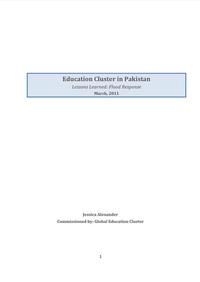Resources
Request support on coordination, information management, capacity development or other education in emergencies areas.
Demande de soutien en coordination, gestion de l’information, développement des capacités et autres domaines de l'éducation en situation d'urgence.
لطلب الدعم في مجال التنسيق ، إدارة المعلومات ، تنمية القدرات أو في اي مجال من مجالات التعليم في مناطق الطوارئ
Solicitar apoyo en coordinación, gestión de la información, desarrollo de capacidades u otra áreas en educación en emergencias.
Featured Resources
below you can find selected tools

COVID-19 Resources
View resources to support education in emergencies coordination during the COVID-19 pandemic.

Guidance on Education Cluster Co-Leadership Arrangements at the Country Level
Indicative Guidance for the establishment and management of co-leadership arrangements at the country level.

Inter-agency Network for Education in Emergencies
For technical education in emergencies resources, please visit the INEE website.
Iraq Education Cluster Strategy 2019
The Iraq Education Cluster Strategy is a consultatively developed document that outlines the Cluster’s approach and operational plan for responding to the current emergency in Iraq. This strategy is intended to guide partners in their implementation of an effective, timely, and quality emergency…
- Coordination: Cluster Strategy
- Emergency: Conflict, Displacement
- HPC: Strategic Planning
Operational Guidance Note: the use of schools, educational facilities and temporary learning centres as shelter
Ideally School buildings and education facilities should not be used as shelter by families who have been displaced due to conflict. Using school buildings as shelter denies displaced and host community children access to safe learning environments.However, in a case of mass displacement where no…
- Coordination: Coordination, Inter-Sector Coordination
- Emergency: Conflict, Displacement
- HPC: Implementation & Monitoring, Strategic Planning
- Technical Areas: Protection
Memorandum of Understanding Iraq Education Cluster Co-Leadership
In Iraq, It has been agreed that UNICEF and Save the Children will be co-lead agencies, in line with the global arrangement. The present Memorandum of Understanding outlines the modalities for this arrangement.
- Coordination: Cluster Management, Leadership
- Emergency: Conflict, Displacement
- HPC: Strategic Planning, Cluster Management, Leadership
Iraq Education Cluster Secondary Data Review Tool 2016
Iraq Education Cluster's Secondary Data Review Tool developed in 2016
- Coordination: Needs Assessment, Information Management
- Emergency: Conflict, Displacement
- HPC: Needs Assessment & Analysis
Iraq Rapid EiE Needs Assessment Key Informant Tool
Iraq Education Cluster Rapid Needs Assessment Key Informant Questionnaire
- Coordination: Needs Assessment
- Emergency: Conflict, Displacement
- HPC: Needs Assessment & Analysis
Iraq Education Cluster Harmonized Needs Assessment Tool
Iraq Education Cluster Harmonized Needs Assessment Questionnaire
- Coordination: Needs Assessment
- Emergency: Conflict, Displacement
- HPC: Needs Assessment & Analysis
Pakistan MIRA Provincial Assessment Working Group Terms of Reference
Pakistan is prone to repeated crisis which impact the well being of the population. In order to understand the impact of the crisis on the population, to understand their needs, identify their location, and develop an appropriate response to their needs, it is necessary to carry out an assessment.…
- Coordination: Cluster Management, Needs Assessment
- Emergency: Floods
- HPC: Needs Assessment & Analysis
Pakistan MIRA Code of Conduct Agreement
This code of conduct provides basic standards in relation to interviewing and documenting information as part of the Multi-cluster Initial Rapid Assessment (MIRA) of the areas where disaster occurs in Pakistan. The principles laid down in this code of conduct are to safeguard the best interests of…
- Coordination: Needs Assessment
- Emergency: Floods
- HPC: Needs Assessment & Analysis
Education Cluster in Pakistan: Lessons Learned Flood Response
The Global Education Cluster commissioned a lessons learned exercise covering the period from the start of the floods in July until March 2010. This report outlines the main findings from this review and highlights a number of recommendations
- Coordination: Knowledge Mangement
- Emergency: Floods
- HPC: Operational Peer Review and Evaluation
Pakistan Assessment Working Group Terms of Reference
In order to further strengthen the inter-cluster coordination on assessments, the ICCM requested OCHA to establish an Assessment Working Group (AWG). The group was composed of cluster and agency needs assessment representatives and/or experts. OCHA chaired the Assessment Working Group and this…
- Coordination: Cluster Management, Needs Assessment
- Emergency: Floods
- HPC: Needs Assessment & Analysis
Filter results
Coordination(selected )
Emergency(selected )
Humanitarian Programme Cycle(selected )
Language(selected )
Publication Date(selected )
Publisher(selected )
Resource Type(selected )
Technical Areas(selected )
Can’t find what you’re looking for?
Contact your relevant language Help Desk










